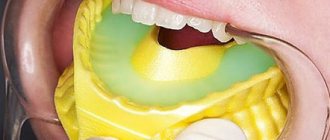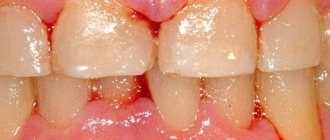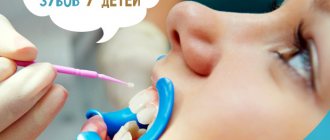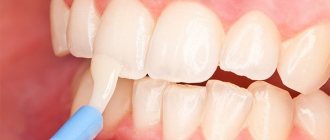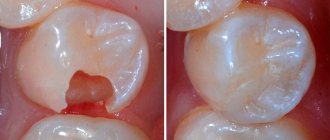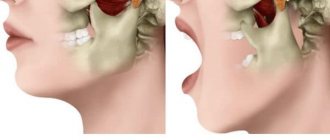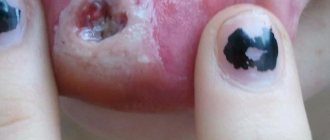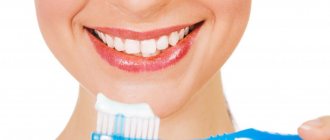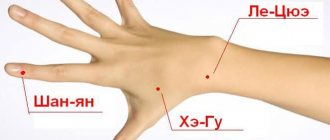Why are teeth loose?
In childhood, loosening of teeth is physiological and does not require doctor’s intervention if it does not cause a lot of inconvenience to the child and does not interfere with the eruption of permanent teeth.
Why do teeth become loose?
- Physiological reasons
- Pathological causes
Physiological loosening is observed in preschool children when they change their baby teeth to permanent ones. In this case, their loosening is absolutely normal, since baby teeth do not have roots and do not sit tightly in the surrounding tissues. They are replaced by permanent teeth, which have a root connected to the bone tissue of the skull.
Beautiful smile
Essential vitamins for tooth enamel
Without these beneficial substances, teeth will never be healthy. Vitamins are needed to nourish bone tissue and dental nerves, regulate metabolic processes, and protect enamel from external factors. The most useful vitamins and microelements that the body requires for enamel regeneration are:
- Calcium. Building material for all bone tissues of the human body. The strength of tooth enamel also depends on it.
- Phosphorus. Promotes tooth growth, strengthens enamel and gives it a snow-white appearance.
- Vitamin D. Combined with calcium, it strengthens teeth and enamel in particular.
- Vitamins B. Have a comprehensive strengthening effect on tooth enamel.
- Vitamin A. Prevents the appearance of roughness and damage to tooth enamel.
An adult's teeth are loose: reasons
In adulthood, teeth also have a certain amount of looseness. Many people think that they are absolutely motionless, but this is not so. Minor vibrations of the teeth in the gums are allowed; this is literally a fraction of a millimeter, allowing you to chew food. If there were not these small gaps and movement of the teeth, then, most likely, they would crumble with the destruction of the jaw and skull bones.
However, significant loosening of the teeth, over a distance of approximately 1 mm in both directions, is considered pathological and can cause tooth loss. Such problems most often require a doctor’s examination and consultation. There are several reasons why teeth become loose in adults.
An adult's teeth are loose, reasons:
- Gingivitis
- Periodontitis
- Periodontitis
- Periodontal disease
All these diseases require treatment, which can be carried out both surgically, with the assistance of orthodontists, and at home. It all depends on the specific ailment.
My front teeth are loose, what should I do?
Risk category:
- The disease most often occurs in children between 3 and 6 years of age.
- Diabetes
- Women taking hormones and oral contraceptives
- Complications after ARVI and sore throat, as well as influenza
Gingivitis
Front teeth are loose, what to do:
- With gingivitis, the gums become inflamed and an infection penetrates into the gum pocket, which destroys the tissue and contributes to the loosening of the tooth. To cope with this problem, you need to thoroughly clean your teeth, use dental floss, irrigators, and special medications.
- Dentists often prescribe antiseptics to disinfect the cavity and prevent bacteria from growing in the pockets that form between the tooth and gum. Next, strengthening agents are prescribed that help make the gums denser and more elastic.
- The prognosis for the treatment of gingivitis is positive, since the connection between the gum and tooth is not disturbed, and only inflammation of the gums is observed. With proper treatment, it is possible to completely get rid of loose teeth and heal all kinds of wounds.
Gingivitis
What foods should you eat to strengthen your gums?
Proper balanced nutrition benefits not only the gums, but the entire body as a whole. Enrichment with vitamins and prevention of their deficiency has a good effect on the health of teeth and gums.
A proper diet is especially useful if you have dental problems. A good diet together with medications recommended by the dentist helps achieve favorable results in a short time.
Healthy foods
So what should your diet be like? First of all, it must necessarily include food with a high content of vitamins, minerals and fiber, fresh fruits, etc.
The preferred products will be presented in the table below:
| The product's name | Its property |
| Fresh herbs | This is what strengthens the gums of teeth and reduces the risk of bleeding and other inflammatory diseases |
| Citrus | Due to the high content of vitamin C and natural antioxidants, the mucous membranes of the mouth and blood vessels are strengthened |
| Nuts | It contains ubiquinone, which, when present in sufficient quantities in the body, reduces the risk of stone formation and the development of inflammatory processes. |
| Red wine | Tannins and antioxidants promote anti-inflammatory and healing effects. However, you should only consume it in moderation. |
| Fish and fresh seafood | Due to phosphorus there is a pronounced strengthening effect on the gums |
| Cheese | Calcium increases the strength of tooth and gum enamel |
| Dairy | Contains vitamin K and calcium, which strengthen gums and teeth, increase the tone of blood vessels and reduce the risk of bleeding |
An alternative method is vitamin complexes, which are taken in courses. The photo below illustrates one of these types of drugs.
Complivit
Treatment of loose teeth due to gingivitis
Pathology occurs in case of complications of nasal breathing, chronic rhinitis or sinusitis, as well as a deviated nasal septum.
Treatment of loose teeth with gingivitis:
- Most often, gingivitis is treated on an outpatient basis, and if all the doctor’s recommendations are followed, it can be cured. For treatment, antibacterial agents are often used, which are used not only topically, but also internally. However, this method of treatment is used only in advanced cases when gingivitis progresses to periodontitis.
- To treat gingivitis, cephalosporin antibiotics, Penicillin , and Doxycycline are used. Hepilor, Givalex , and astringent liquids are used as rinses
- You can also use a solution of Miramistin, Chlorhexidine. Sometimes Decasan . These are all antiseptics that help eliminate pathogenic microorganisms. This applies not only to bacteria, but also to viruses and fungi that cause gingivitis.
Teeth are loose
How to strengthen your gums if your teeth are loose?
A fairly common cause of loose teeth is periodontal disease. This is the destruction of the tissues that surround the teeth, with the transition to the bone. As a result, the tooth initially becomes loose and then falls out.
How to strengthen your gums if your teeth are loose:
- There are several methods of treating this disease, the most popular are dental ones, which are carried out in the doctor’s office. A modern dentist has a huge number of instruments and devices that help cope with periodontal disease.
- At the initial stage, a treatment is carried out during which all plaque and tartar are removed, where bacteria and microorganisms that destroy the gums accumulate. Next, after cleaning, laser treatment can be carried out, during which the inflamed tissue drains and the areas surrounding the tooth are restored. After healing, the teeth are restored and no longer become loose.
- Also in dentistry, the help of an orthodontist is often used. If one specific tooth is loose, it has been treated, and there is no inflammation, then a kind of splint is often used. These are plastic or metal overlays that are fixed to the teeth using a special compound.
- Don’t worry, these products are attached on the side of the tongue, so they are not visible at all during a conversation, as well as a smile. Thanks to such splints, a loose tooth is fixed to two nearby ones, thereby stopping its destruction and loss.
Bare necks
Is fluoridation of teeth beneficial?
Very often you can hear that modern dental clinics offer their clients a dental fluoridation procedure. And this procedure is surrounded by a whole cloud of myths. The most popular one is that teeth are only getting worse, it’s all just business, “pumping” money out of patients. So what should we believe?
Fluoridation is a procedure for saturating hard dental tissues with fluoride compounds; special liquids are applied to the enamel. Why this can be useful: enamel increases its natural resistance to acids, dental restorations (if we are talking about them) last longer, tooth hypersensitivity is reduced, and the risk of caries formation is reduced. When it comes to children, fluoridation promotes the maturation of tooth enamel.
Fluoridation of teeth
Fluoridation can be simple or deep. Simple fluoridation is the application of a special fluoride varnish to the teeth, as well as the use of fluoride preparations together with mouth guards. Fluoride varnish can be applied to teeth 2-4 times a year.
Fluorofil (fluoride varnish)
Deep fluoridation is a more complex process. But the effectiveness will be higher than the method with fluoride varnish and mouth guards. The substance penetrates not only the enamel, but also the internal structures of the tooth. This is a multi-step process that can be done on the advice of a doctor. The procedure is not the cheapest, but if you consider it to be the prevention of tooth decay, then it is a reasonable investment.
Summarizing the experience of dentists, it should be said that one of the best fluoride prevention systems for caries for children is the complex dental fluoridation system “DENTAL RESOURCES”
Children can also undergo fluoridation. Usually these are fluoride varnish application courses. After them, the enamel layer is significantly strengthened, and the initial caries often disappears.
It is important that there are no contraindications to fluoridation: these include individual allergic reactions, endemic mottling of teeth, and an increase in the concentration of fluoride in water.
Video: Fluoridation of teeth - benefits and harms
How to strengthen loose teeth at home?
Nowadays, many people do not have much time to visit the dentist, so they strive to cure most diseases on their own. This can be done with simple manipulations. Below we present several remedies that perfectly help cope with loose teeth.
How to strengthen loose teeth at home:
- First of all, start drinking a vitamin complex with microelements. Ask the pharmacy for any one that suits your age and take it according to the instructions. And additionally vitamin C 100 mg 3 times a day with food.
- Salt is an excellent antiseptic and promotes tissue healing. To prepare the solution, use two teaspoons, which are diluted with 200 ml of water. The result is a fairly strong solution. A sip of this solution is taken into the mouth and held in it for one and a half minutes. It is necessary to roll the water from side to side to rinse out all the plaque from the teeth.
- Mustard can also be used along with salt . It helps cope with gum inflammation and prevent tooth loosening. You need to mix a teaspoon of powder with a teaspoon of salt and add a little vegetable oil until you get fasting. This paste is applied to the teeth and left for 5 minutes. You can brush your teeth using a soft brush.
- Basil is great for relieving inflammation. To do this, you need to pour 1.5 teaspoons of dry and fresh leaves into 200 ml of boiling water and leave for 20 minutes. Next, you need to rinse your mouth with the mixture. Rinse should be done early in the morning and in the evening, before going to bed.
- In 2014, in one place of dental universities in the United States, they conducted a study, during which they found that coconut or sesame oil . For treatment, you need to take a tablespoon of oil into your mouth and roll it from side to side for 20 minutes. Remember, this remedy should never be swallowed, but should be spat out. The product helps get rid of gingivitis and periodontal disease. It has a great effect on the condition of teeth and the tissues that surround them.
- Turmeric will help cope with periodontal disease and loose teeth . In order to cure the disease, it is necessary to dilute the spice with water until a paste is obtained. Next, the product is applied to a cotton swab and smeared on each tooth. The product is kept for 10 minutes. You can perform the procedure at night, after brushing your teeth. In the morning, clean with a soft toothbrush and rinse thoroughly. Remember, if you periodically experience periodontal disease, or peritonitis, you need to visit the dentist frequently.
Folk recipes
Folk remedies
Traditional medicine has accumulated vast experience in solving this problem. But folk remedies should only be an addition to the main treatment. First you need to go to the dentist. He will determine the cause of loosening and prescribe comprehensive treatment.
Such a visit cannot be delayed. If a tooth begins to hurt, it becomes difficult to chew, or it becomes mobile, you should immediately consult a doctor. In such cases, anti-inflammatory treatment is prescribed, as well as home treatments.
If an item is in too much of a state of disrepair, it may be necessary to remove it. But you shouldn't do it yourself. Only an experienced specialist can extract a tooth correctly. He will competently process the resulting hole. This is an important condition that will help avoid inflammation.
It is best to supplement the treatment prescribed by the doctor with home treatments. Such complex therapy will be much more effective. In order for a loose element to recover more quickly, you should adhere to the following recommendations :
- Stop smoking.
- Ensure proper and regular nutrition.
- Massage your gums regularly.
- If your teeth are not too loose yet, you can train them. To do this, chew solid food carefully. This will strengthen them.
Folk remedies give a good effect.
Please note : Remember that folk remedies can also cause harm. Sometimes they are incompatible with certain medications. Be sure to consult your doctor regarding traditional methods. If you choose them correctly, the treatment will give a much more noticeable effect.
We offer you the most affordable, effective and safe folk remedies for eliminating tooth mobility.
Fir oil
Soak a piece of cotton wool in fir oil and apply for 15 minutes. to the problem area.
Sea buckthorn oil
You need to moisten a clean finger in it and gently massage the sore area. Repeat the procedure three times a day.
Calendula and chamomile
You need to take 2 tbsp of each herb. spoons and pour a liter of boiling water. Leave for about an hour, strain. Rinse your mouth with the infusion three times a day.
Yarrow
Remember that only freshly picked leaves have a healing effect. You need to carefully squeeze the juice out of them using a juicer. It is used to wipe the gums. Then you need to rinse your mouth with clean water.
St. John's wort
Pour 2 tbsp. spoons of herbs with a liter of boiling water. Place in a dark place for about an hour, then strain. Rinse your mouth with this infusion three times a day.
Garlic
It can only be used if there are no open wounds. You need to peel a clove of garlic, cut it and apply it for 10 minutes.
All these tools have proven themselves well. They can be an excellent addition to the main treatment.
A tooth becomes loose after an impact, how to strengthen it?
Many men have encountered a situation where, during a fight and a blow to the jaw area, their front teeth begin to loosen. There is no need to be upset; you need to see a doctor. There are several reasons why teeth become loose and hurt after an impact.
Causes:
- The first is a tooth root fracture. In this case, with almost one hundred percent probability it will have to be removed, since there is a fracture
- Tooth dislocation. The main symptom is loosening and change in position relative to the dentition
- Minor offset
A tooth becomes loose after an impact, how to strengthen it:
- In all these cases, immediately after a fight, it is necessary to provide this tooth with rest, eat only liquid food, refuse apples, crackers, nuts, as well as foods that need to be bitten off with the front teeth.
- Next, cold water is applied to the gum and lip to relieve swelling. After this, rinse your teeth with any antiseptic; the ideal option would be a solution of Furacilin, Decasan or Miramistin. This will help reduce the chance of re-infection. After all, in the area of dislocation there are damaged tissues that can become infected.
- If there is no fracture, but only a slight dislocation, then prolonged rest, as well as oral care with rinsing, after a few months helps to tighten the tooth and strengthen it. In this case, the tissue is restored and the tooth no longer wobbles. But most often, the help of a dentist is needed.
Implantation
Treatment of loose teeth
You can save a tooth that has fallen out. Please note that if this happens, the tooth should never be completely dried out. Because this way you will make him dead.
Treatment for loose teeth:
- The ideal option is to put it by the cheek and in this position come to the doctor. You can put it in regular saline solution, which is sold at the pharmacy and costs a penny. In a container with saline solution, you need to bring the tooth to the dentist.
- The dentist places the tooth in place and splints it. That is, they apply a splint, fastening it to adjacent teeth. Special medications are prescribed that will prevent the development of infection and the attachment of bacteria to the affected area.
- Further, strengthening drugs may be prescribed that accelerate tissue healing. After 3-12 months, the splint is removed and the tooth is no longer loose. During this time, the bone tissue is restored, as well as the gums that are located around the tooth.
Prosthetics
My front tooth is loose, how can I strengthen it?
The tooth is splinted. This is a common procedure performed for periodontal disease. The fact is that most often periodontal disease does not damage the entire dentition, but only a few teeth.
The front tooth is loose, how to strengthen it:
- To reduce the load, it is redistributed between other teeth. The manipulation is done during the period of remission of periodontal disease, under local anesthetic.
- The patient is injected with an anesthetic and a special device is used to cut out a furrow into which a fiberglass tape is inserted.
- Next, the “trench” is laid using special photopolymers, which harden under the influence of ultraviolet radiation.
- After curing, a kind of bridge is obtained that holds the dentition in a stationary state. This helps to redistribute pressure from one tooth to the entire dentition.
Splinting
Home remedies are good, but you can still achieve excellent results and completely overcome the disease with the help of a dentist. The fact is that some gum diseases may have similar symptoms, but the causes may differ. The dentist will help you understand the cause that caused the disease and eliminate it.
Why can teeth become loose?
Teeth can become loose for various reasons. The most common of these is periodontal disease. This disease affects the gum tissue. They become loose, bleed, turn pale, and itch appears. Over time, the teeth are no longer held so tightly by the affected gums and begin to loosen.
To prevent this, diseases of the gums and teeth should be treated in a timely manner. Gums and teeth can react very quickly to problems that appear in the body. Periodontal disease can be triggered by the following factors :
Periodontal disease can be caused by many factors.
There may be other reasons. They are installed by a doctor. It is up to the doctor to decide how to strengthen a loose tooth. It is very important to correctly establish the root cause of this phenomenon. Depending on it, treatment tactics will be selected.
Even if you take good care of your teeth, they can become loose. There are many reasons for this. Dentists have identified as many as 17 reasons :
- Oral diseases. The inflammatory process in the mouth develops most often with periodontitis, periodontitis, and gingivitis.
- Chronic diseases. Diabetes, arthritis, psoriasis, metabolic disorders or thyroid disorders are especially dangerous in this regard.
- Problems with the thyroid gland.
- Diabetes.
- HIV. Decreased immunity provokes the development of acute inflammatory processes. Infections and viruses attack the entire body.
- Psoriasis.
- Osteoporosis or arthritis.
- Impaired metabolism.
- Vitamin deficiency and mineral deficiency. The entire body suffers from this, including the oral cavity.
- Pathology of the dentition. Due to malocclusion, the pressure on different areas changes. Some units experience excessive pressure, while others do not participate in chewing at all. Teeth that are constantly exposed to increased stress quickly become loose.
- Poor nutrition. Leads to vitamin deficiency and malfunction of internal organs.
- Hereditary tendency. If one parent had weak teeth, this is often inherited.
- Pregnancy, breastfeeding, menopause, adolescence, menstruation. All these conditions are associated with hormonal fluctuations. This affects the entire body.
- Bad habits.
- Injury. It's not just a blow to the jaw. You can injure your teeth even if you grind them. Some people experience this phenomenon in their dreams.
- Drug abuse.
- Diseases of one or several internal organs.
Before teeth become loose, you may experience bleeding gums, discomfort, and pain when chewing food.
Almost any change in the body or disease can lead to the loss of one or more elements. If you want to save your teeth, then you should take care not only of the oral cavity, but also of the entire body. You need to take care of your health throughout your life, and not when problems with it begin to appear.
If a tooth is already loose, the dentist will decide how to strengthen it. It is important to notice the problem at the very initial stage of development. Before teeth become loose, you may experience bleeding gums, discomfort, and pain when chewing food.
VIDEO: Tooth is loose
- When and at what age should you start brushing your child’s teeth: advice from dentists.
- How to keep your teeth white: rules, dental advice for white teeth
- The best toothpastes that remove tartar: rating.
- A healthy tooth hurts: reasons. Why does a healthy wisdom tooth hurt when pressed after treatment?
- Is it worth it and how to treat a wisdom tooth: tips, reviews, complications
- How to relieve tooth sensitivity at home?
- Pain after removal of a nerve or tooth: causes, treatment.
- How many teeth does an adult have in his mouth normally - Anatomy
- Swollen cheek after tooth extraction, what to do?
- Lunar calendar for dental treatment: table.
- Malocclusion in adults. How to straighten teeth?
- Inflammation of the gums: signs and causes, treatment with medications and folk remedies, prevention
- Teeth whitening. How to whiten teeth at home?
- How to remove plaque on teeth? How to remove plaque at home?
- What are veneers? Veneers on teeth: pros and cons, before and after photos
- Stains, coffee stains on teeth: how to whiten? How to drink coffee so your teeth don't turn yellow?
